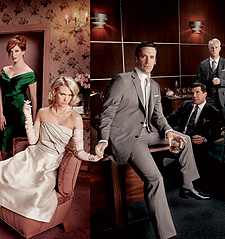Mad Men is earning the industry's top accolades - five Golden Globes and 20 other awards - demonstrating that audiences still hunger for truth, and feel poorer for the lack of it.
The series title, as episode one informs the viewer, is taken from a nick-name coined for advertising executives working on New York's exclusive Madison Ave. It was a name they gave themselves. The open question in the series is whether it refers to the wildly privileged existence they led, or their ability to elevate miscommunication to the level of an art-form. I think the tag-line of the series goes some way to answering it: 'Where the truth lies.'
 Don Draper (Jon Hamm) is the key creative at advertising firm Sterling Cooper, a business that numbers cigarette manufacturers, banks and steel magnates amongst its clients. Perception is everything. Truth is a tool that is employed only when it serves to increase marketing share. In fact truth is in short supply throughout Don's life. It is the 1960s, the age of male egotism, the pre-and-post dinner drink, and the ubiquitous cigarette. Don's family is convinced that he 'works so hard!', but his colleagues seem to spend the majority of their time loafing and making lewd suggestions to secretaries. He leads a double life, flitting between his office and his mistress, and the deceptions only deepen when he arrives home. Don's wife, Betty, has to admit that she hardly knows anything about his past. Not surprising when episode three reveals that Draper is not even his real name.
Don Draper (Jon Hamm) is the key creative at advertising firm Sterling Cooper, a business that numbers cigarette manufacturers, banks and steel magnates amongst its clients. Perception is everything. Truth is a tool that is employed only when it serves to increase marketing share. In fact truth is in short supply throughout Don's life. It is the 1960s, the age of male egotism, the pre-and-post dinner drink, and the ubiquitous cigarette. Don's family is convinced that he 'works so hard!', but his colleagues seem to spend the majority of their time loafing and making lewd suggestions to secretaries. He leads a double life, flitting between his office and his mistress, and the deceptions only deepen when he arrives home. Don's wife, Betty, has to admit that she hardly knows anything about his past. Not surprising when episode three reveals that Draper is not even his real name.
Don Draper daily expresses an all too modern cynicism for truth. He teases his mistress for believing in something like love:
"I'm pretty certain 'that' is something some guys like me came up with to sell nylons."
But under the surface Don's life seethes with a quest for such axioms. The failure of men and women to understand each other drives the plot week after week. Draper grapples personally with what women want - his wife has every material blessing, but suffers from anxiety; his mistress will not run away with him, no matter how much he offers. And in the office he creates an uncomfortable silence suggesting that they try and consider what their female clients might desire:
"Maybe there is some mysterious thing that they want which we've been missing."
Deep down Don is afraid. He and his wife have everything, but the truth threatens to take it all away. Don's shadowy past keeps threatening to surface and somehow wreck his idyllic home and comfortable career. Betty is unable to see that her anxiety attacks stem from things she is not prepared to admit to herself. She doesn't realise that the divorced woman down the road makes her nervous because subconsciously she fears her husband will leave her.
Mad Men offers viewers a picture of a beautiful façade behind which fear and uncertainty flourish. At the most basic level it reaffirms that wealth does not equal happiness. But it goes one step further: it reminds us that in a world of fabrications and misinformation, we will not be satisfied with anything but reality. Don Draper may play with lies in the office, but he knows the truth is still out there and it is powerful.
'Beware, your sins will find you out' has become something of a truism; few people realise that it comes from Numbers 32:23, where Moses warns God's people of the consequences of neglecting the truths he has revealed to them:
"But if you fail to do this, you will be sinning against the LORD; and you may be sure that your sin will find you out."
Mad Men recognises the truth at many levels. Products, reputations and relationships constructed from a tissue of lies cannot be expected to last. Don, like many today, says he believes there is only today and lives as if there was no tomorrow. But his confidence cannot eliminate his guilt. He looks around the office and sees brash, capable, threatening young men who are yet to realise that skills could fade, opportunities shrivel and they might fall from grace. At our most basic level human beings recognise there will be an accounting.
In the case of the Drapers, though, the viewer can see that the truth could also be their best hope. If they could only communicate honestly with each other Don and Betty would discover a far more satisfying life. The longer they leave their admissions, though, the less likely there will be anything left standing when what lives in the darkness is finally brought into the light. The question is, will the viewer be able to recognise the personal application? Jesus famously told his listeners that if they could accept what he had to say about life, the truth 'would set them free'. However recognising the lies we tell ourselves is one thing; being able to admit them is another thing entirely.


























